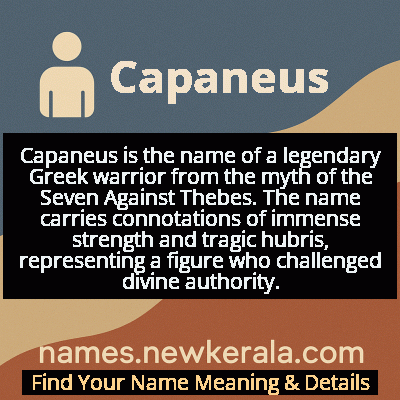Capaneus Name Meaning & Details
Origin, Popularity, Numerology Analysis & Name Meaning of Capaneus
Discover the origin, meaning, and cultural significance of the name CAPANEUS. Delve into its historical roots and explore the lasting impact it has had on communities and traditions.
Name
Capaneus
Gender
Male
Origin
Greek
Lucky Number
8
Meaning of the Name - Capaneus
Capaneus is the name of a legendary Greek warrior from the myth of the Seven Against Thebes. The name carries connotations of immense strength and tragic hubris, representing a figure who challenged divine authority.
Capaneus - Complete Numerology Analysis
Your Numerology Number
Based on Pythagorean Numerology System
Ruling Planet
Saturn
Positive Nature
Ambitious, efficient, realistic, and authoritative.
Negative Traits
Materialistic, stressed, confrontational, and can be overly ambitious.
Lucky Colours
Dark blue, black.
Lucky Days
Saturday.
Lucky Stones
Blue sapphire, amethyst.
Harmony Numbers
2, 4, 6.
Best Suited Professions
Business leaders, managers, financial services, law enforcement.
What People Like About You
Leadership, determination, organizational skills.
Famous People Named Capaneus
Capaneus of Argos
Mythological Warrior
One of the Seven Against Thebes who boasted he would sack the city regardless of Zeus's will
Capaneus (Literary Character)
Literary Figure
Prominent character in Aeschylus' 'Seven Against Thebes' and Statius' 'Thebaid'
Capaneus (Dante's Inferno)
Literary Character
Appears in Canto XIV of Dante's Inferno as one of the blasphemers in the seventh circle of Hell
Name Variations & International Equivalents
Click on blue names to explore their detailed meanings. Gray names with will be available soon.
Cultural & Historical Significance
The character's legacy extends beyond Greek mythology into Roman literature, particularly in Statius' epic 'Thebaid,' where his death is depicted with elaborate detail. During the Renaissance and later periods, Capaneus became a symbol of blasphemous pride and resistance to divine will. Dante Alighieri immortalized him in 'The Divine Comedy,' placing him in the seventh circle of Hell among the blasphemers, where he continues to curse God even in damnation, reinforcing his role as the ultimate symbol of unrepentant defiance. His story has influenced Western literature's understanding of tragic heroes and the consequences of overreaching ambition.
Extended Personality Analysis
Individuals named Capaneus are typically characterized by immense confidence, physical strength, and an unyielding determination that borders on stubbornness. They possess a natural leadership quality and often take charge in challenging situations, driven by an inner conviction in their own abilities. However, this self-assurance can manifest as arrogance or hubris, particularly when they believe their capabilities surpass external limitations or authority. Their bold nature makes them formidable in pursuing goals but can also lead to conflicts with established systems or rules they perceive as unnecessary constraints.
Capaneus personalities often demonstrate exceptional courage in the face of adversity, refusing to back down even when confronted with overwhelming odds. They thrive on challenges and may deliberately seek out difficult tasks to prove their mettle. This competitive spirit is balanced by a strong sense of loyalty to their chosen causes or companions, though their independent nature means they prefer to operate on their own terms. The tragic aspect of this personality type lies in their potential inability to recognize when their ambition has crossed into recklessness, making them vulnerable to dramatic failures despite their considerable talents and strengths. Their legacy serves as a reminder that while confidence and determination are virtues, they must be tempered with wisdom and respect for boundaries.
Modern Usage & Popularity
In contemporary times, Capaneus remains an extremely rare given name, primarily used by classical scholars, mythology enthusiasts, or parents seeking unique names with strong mythological connections. The name sees occasional usage in academic circles and literary references rather than mainstream naming trends. Its association with hubris and tragic downfall limits its popularity as a given name, though it occasionally appears in fantasy literature or role-playing games as a character name. The name maintains a niche presence in countries with strong classical education traditions, particularly Greece and Italy, but remains virtually unknown in general population naming statistics worldwide. In modern contexts, the name is more likely to be encountered in literary analysis, classical studies, or as a symbolic reference in discussions about ambition and its consequences rather than as an actual personal name.
Symbolic & Spiritual Meanings
Capaneus symbolizes the dangerous intersection of human ambition and divine authority, representing the eternal struggle between mortal capability and cosmic order. His story serves as a powerful metaphor for hubris—the excessive pride that leads to one's downfall—and the consequences of challenging established powers beyond one's station. The thunderbolt that strikes him embodies divine justice and the limits of human achievement, making his name synonymous with the concept that some boundaries should not be crossed. In a broader sense, Capaneus represents the tragic hero whose greatest strength becomes his fatal flaw, a reminder that exceptional talent without wisdom or humility often leads to destruction. His enduring symbolic power lies in his representation of the human condition—our capacity for greatness and our vulnerability to the very ambitions that drive us toward achievement.

